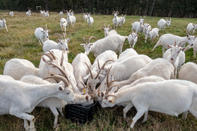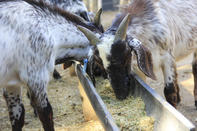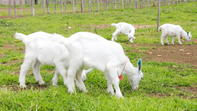Pasture (grazing land covered with grass) tends to be high in energy and protein when it is in a vegetative (growing) state. However, while it is growing it has a high moisture content and it is difficult for a high-producing doe or fast-growing kid to eat enough grass to meet its nutrient requirements.

In addition, as pasture plants mature, its taste and digestibility decline, so it is important to rotate pastures to keep plants in a vegetative state. Outside of the growing season, hay will become the main ingredient of your goats’ diets.
Ryegrass tastes well throughout the grazing season until it matures in September to October. Kikuyu easily becomes coarse and unpalatable, especially later in summer. Take care not to feed too much feed concentrate (high energy or high protein feeds such as wheat or soybean meal) - because they tend to be expensive.
But also do not expect too much from the pasture and feed too little dairy meal, thereby limiting the goat's production. Grazing periods for goats must be coordinated to fit in with the fertilizing and irrigation schedules of the pastures.
Leave enough time after fertilization (before grazing) to reduce the risk of poisoning from the fertilizer. It may be necessary to mow excess growth of coarse grass during the peak times of the season.
Supplementing Goat Feeding on Pastures

Where pasture forms the basis of roughage supply, the main problem will be to decide what would be the dry matter (DM) intake from the pasture. If extra concentrates are given, the goats may change their intake and eat less pasture. If only poor quality pastures are available, feeding can be supplemented with 200 - 350 gm of concentrate per animal/day depending on their age.
The "eye of the stockman" is very important as the farmer will have to monitor the response of the goats to changes in the availability and palatability of the grazing. The goat farmer must estimate expected DM intake from the pasture and feed a supplement of concentrates accordingly.
If the farmer suspects that DM intake should be higher than their estimate, they can reduce the concentrate ration. If milk production drops as a result of the change of feeding, concentrate feeding needs to be adapted to ensure the drop in milk production is not permanent. Dairy goats need grain in their diet to support lactation.
Pregnant goats (first four months of pregnancy) should have access to good pastures for about 5 hours/day and can be supplemented with 5 kg of green fodder per day. In the last month of pregnancy, this can be increased to 7 kg per day in addition to giving feed concentrate of 250 - 400 gm/day/animal.
Good pastures should provide all the nutrients for a non-lactating goat needs, but they may need feed concentrates of 150 - 200 gm/day on poor pastures. Goats should always have free access to a high-quality loose mineral formulated specifically for goats. This should contain enough copper and be soft and not a hard mineral block.
Feeding Kids on Pastures

Up to three months of age, the baby goat will receive a mixture of milk (goat or cow’s milk), green forage and creep feed - a nutrient-rich feed placed in a special area which adult goats can’t access.
From 90 days the kids can be set out to graze on pastures for around 8 hours/day. Supplementary feed with a protein content of 15 - 18% can be fed daily; about 125 - 200 gm/animal/day. Provide dry fodder at night time or during the rainy season.
Please note: Information is for educational and informational purposes only and may not be construed as feeding or nutritional advice. For more information on feeding your goats contact your animal health technician, veterinarian or animal feed supplier.
By Marinda Louw